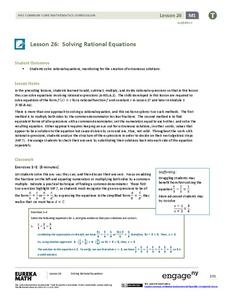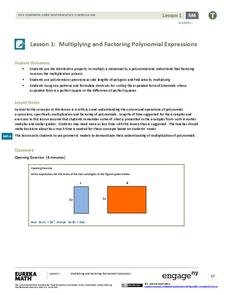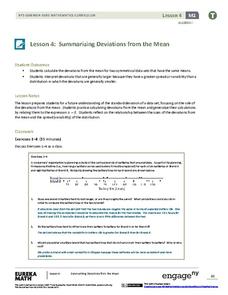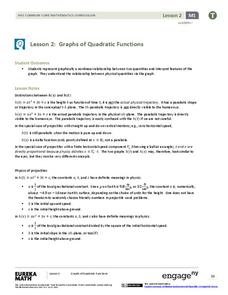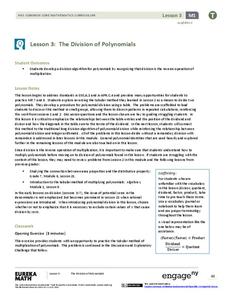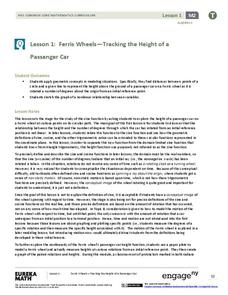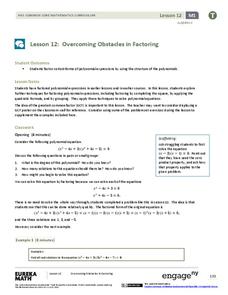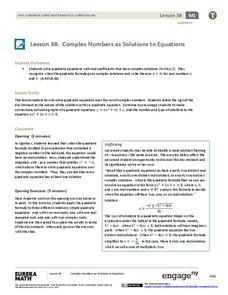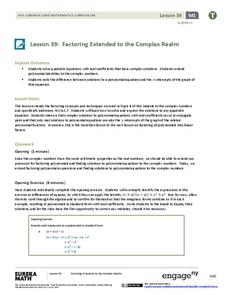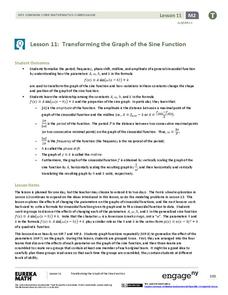EngageNY
Adding and Subtracting Rational Expressions
There's a fine line between a numerator and a denominator! Learners find common denominators in order to add and subtract rational expressions. Examples include addition, subtraction, and complex fractions.
EngageNY
Solving Rational Equations
What do fractions and rational expressions have in common? Everything! Learners use common denominators to solve rational equations. Problems advance from simple to more complex, allowing pupils to fully understand the material before...
EngageNY
The Definition of a Parabola
Put together the pieces and model a parabola. Learners work through several examples to develop an understanding of a parabola graphically and algebraically.
EngageNY
Multiplying and Factoring Polynomial Expressions (part 1)
Polynomial multiplication and factoring go hand in hand. Why not teach them together. This resource begins with an area model for distributing a monomial and then connects the process to factoring the GCF. Learners then advance to...
EngageNY
Recursive Formulas for Sequences
Provide Algebra I learners with a logical approach to making connections between the types of sequences and formulas with a lesson that uses what class members know about explicit formulas to develop an understanding of...
EngageNY
Solving Quadratic Equations by Completing the Square
Many learners find completing the square the preferred approach to solving quadratic equations. Class members combine their skills of using square roots to solve quadratics and completing the square. The resource incorporates a...
West Contra Costa Unified School District
Connecting Fractions and Rational Expressions
Teach class members to work with rational expressions using their knowledge of fractions. The lesson plan starts with a warm-up of rational expressions at four different levels of complexity. The different levels continue throughout...
EngageNY
Describing the Center of a Distribution
So the mean is not always the best center? By working through this exploratory activity, the class comes to realize that depending upon the shape of a distribution, different centers should be chosen. Learners continue to explore...
EngageNY
Estimating Centers and Interpreting the Mean as a Balance Point
How do you balance a set of data? Using a ruler and some coins, learners determine whether the balance point is always in the middle. Through class and small group discussions, they find that the mean is the the best estimate of the...
EngageNY
Summarizing Deviations from the Mean
Through a series of problems, learners determine the variability of a data set by looking at the deviations from the mean. Estimating means of larger data sets presented in histograms and providing a way to calculate an...
EngageNY
Summarizing Bivariate Categorical Data
How do you summarize data that cannot be averaged? Using an exploratory method, learners complete a two-way frequency table on super powers. The subject matter builds upon 8th grade knowledge of two-way tables.
EngageNY
Graphs of Quadratic Functions
How high is too high for a belly flop? Learners analyze data to model the world record belly flop using a quadratic equation. They create a graph and analyze the key features and apply them to the context of the video.
EngageNY
The Division of Polynomials
Build a true understanding of division of polynomials. Learners use their knowledge of multiplying polynomials to create an algorithm to divide polynomials. The area model of multiplication becomes the reverse tabular method of division.
EngageNY
Ferris Wheels—Tracking the Height of a Passenger Car
Watch your pupils go round and round as they explore periodic behavior. Learners graph the height of a Ferris wheel over time. They repeat the process with Ferris wheels of different diameters.
EngageNY
Radicals and Conjugates
Make the irrational rational again! Continuing the theme from previous lessons in the series, the lesson relates the polynomial identity difference of squares to conjugates. Learners develop the idea of a conjugate through analysis and...
EngageNY
Overcoming Obstacles in Factoring
What do you do when factoring doesn't work? Learners complete the square when faced with quadratic expression that don't factor traditionally. They then use factoring by grouping to solve polynomial equations.
EngageNY
Structure in Graphs of Polynomial Functions
Don't allow those polynomial functions to misbehave! Understand the end behavior of a polynomial function based on the degree and leading coefficient. Learners examine the patterns of even and odd degree polynomials and apply them to...
EngageNY
The Remainder Theorem
Time to put it all together! Building on the concepts learned in the previous lessons in this series, learners apply the Remainder Theorem to finding zeros of a polynomial function. They graph from a function and write a function from...
EngageNY
Modeling Riverbeds with Polynomials (part 1)
Many things in life take the shape of a polynomial curve. Learners design a polynomial function to model a riverbed. Using different strategies, they find the flow rate through the river.
EngageNY
Are All Parabolas Similar?
Congruence and similarity apply to functions as well as polygons. Learners examine the effects of transformations on the shape of parabolas. They determine the transformation(s) that produce similar and congruent functions.
EngageNY
Complex Numbers as Solutions to Equations
Quadratic solutions come in all shapes and sizes, so help your classes find the right one! Learners use the quadratic formula to find solutions for quadratic equations. Solutions vary from one, two, and complex.
EngageNY
Factoring Extended to the Complex Realm
A solution will work one way or another: find solutions, or use solutions to find the function. Learners use polynomial identities to factor polynomials with complex solutions. They then use solutions and the Zero Product Property to...
EngageNY
Transforming the Graph of the Sine Function
Build a solid understanding of trigonometric transformations through exploration. Learners work in teams to analyze the effects of different algebraic components on the graph of a sine function.
EngageNY
Ferris Wheels—Using Trigonometric Functions to Model Cyclical Behavior
Have class members going in circles as they model the path of a Ferris Wheel using trigonometric functions. Building on the previous lesson in this series on transformations, learners use trigonometric functions to model wheels of...

